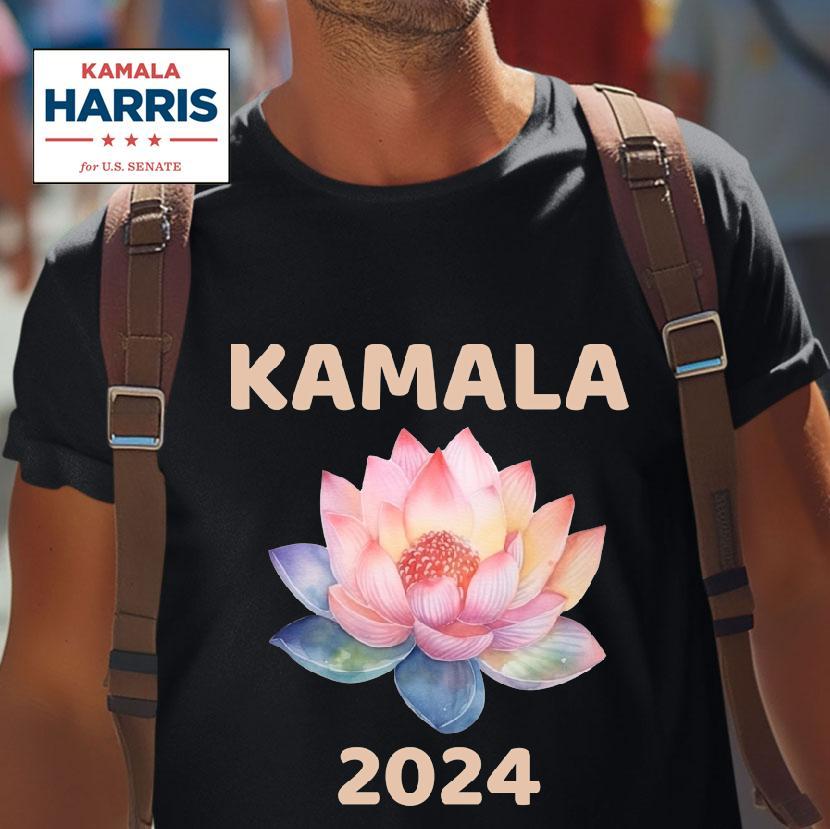Note: If you wish to receive, via e-mail, (1) my weekly newsletter or (2) daily copies of these posts, write to me at rrbates1951@gmail.com. Comments may also be sent to this address. I promise not to share your e-mail with anyone. To unsubscribe, write here as well.
Monday
With Kamala Harris having just wrapped up the Democratic nomination (!), I’m reconfiguring an essay I wrote four years ago after Joe Biden chose her as his running mate. When I learned that Harris’s first name means “lotus” in Sanskrit, I researched the flower and discovered that it is associated with Lakshmi, the Hindu goddess of divine energy, who was once incarnated as a lotus. Given that I’ve just written an essay on the Fisher King story, where a wasteland presided over by an impotent monarch is rejuvenated by a young knight, the lotus symbolism seems even more applicable. In Hindu mythology, the lotus is often regarded as a fertility symbol, associated with life-giving waters.
This is how the lotus is depicted in a poem that appeared in my father’s collection An ABC of Radical Ecology. There is at least one environmental poem—sometimes more—for each letter of the alphabet, and the letter I is associated with the Egyptian fertility goddess Isis, whose flower was the blue lotus.
My father was fascinated by erotic symbols as they appear in different mythological traditions, so in his “I” poem he also mentions Ishtar, the Mesopotamian goddess of sexuality, and Iesus, who many early Christians regarded as a fertility god along the lines of Dionysus. I’m sure he would have added in Lakshmi if her name had begun with an “I.” (I’m not sure where Ignatz, the brick-throwing mouse in the old George Herriman cartoon strip, fits in.)
Bates pairs his “I” poem with his “H” poem, which stands for “the Hero from Inner Space.” Think of the “I” poem, then, as a female poem balancing out a male poem. Drawing on the work of Carl Jung, Joseph Campbell, and many others, Scott Bates looks to balance the male and the female. When these forces unite, they achieve an ecstatic bliss where time stops, a kind of infinity. We all long for this sacred union.
I’ll explain in a moment how this applies to Kamala Harris’s candidacy. First, however, here’s the poem:
While I on the Other Hand Is for Isis
(and for Iesus and Ishtar and Ignatz and
All Those Other Infinities)
“I am risen!” said Jesus making love
to the Priestess of Isis…–Lawrence
I
is
the Goddess
sitting on a lotus
floating on a lotus
in the middle of the Nile
X
is her legs crossed
O
is her leaf
U
is her flower
the Love of her Life
and
S
is
her serpentine
smile
While H the Hero is on a quest, Isis sits on the sacred lotus floating in the middle of the Nile. The epigraph, taken from the D. H. Lawrence novella The Man Who Died, refers to the resurrected Jesus turning his back on Calvinist Christians (Trump’s most loyal base) and impregnating a priestess of Egypt’s fertility goddess. The Jesus in the novella has been emptied out by too much sexual repression and needs the healing that she represents. “I am risen” has a sexual double meaning, and the union of Jesus and Isis represents the coming together of sky and earth, individual and community, self and other.
Put another way, Isis is the valley of sensuality that the hero seeks. The letters featured in the poem are all (with the exception of the last one) perfectly symmetrical and therefore represent balance and completeness. The “U” opens up as a flower while the “S,” representing the goddess’ serpentine smile, is a wild card, a final mystery that eludes us.
How does this apply to “Lotus” Harris? When I wrote this post in 2020, I could say that she balanced out the Biden ticket, a (relatively) young woman of color balancing out an older white patrician, a life force rejuvenating this representative of the old order. But one could also argue that Harris herself represents a healthy balance of female and male.
On the female side, there is the way she opposes those seeking to control and regulate women’s bodies. She is far more comfortable in talking about abortion than Biden, while GOP attacks that she is hypersexualized are falling flat. And while Harris doesn’t exactly have a serpentine smile—rather a boisterous laugh—she offers the hope of renewal in a land that is being threatened by male patriarchs that are hostile to anything sexual.
Oh, and Isis is a cat lady, a goddess often depicted with a black feline. So when it comes to Harris’s female side, think of this as “Auntie Kamala” or (as her stepchildren call her) “Mamala.”
But she has also excelled in activities that have been traditionally gendered male, a tough prosecutor who uses the law in the cause of restorative justice and civic order. Black women prosecutors have been giving Trump a difficult time recently—think also of Tish James and Fani Willis—and Harris is another entry into that field. Her “male” aggressiveness is one thing that is exciting those Democrats who worried that Biden wasn’t taking it to Trump hard enough. Few credibly argue that Harris lacks the toughness required of a leader.
In other words, Harris has within her both female and male. She’s empathetic and tough both.
Democrats hope that voters will be undertaking pilgrimages to voting booth shrines to pay homages to this lotus figure. Or as some are saying, “Lotus for POTUS.”
The alternative is a full plate of toxic masculinity.


